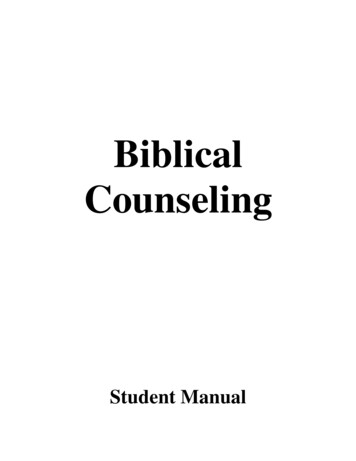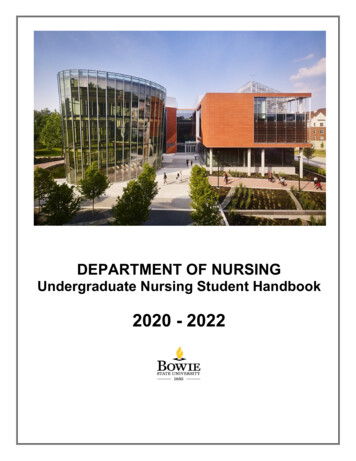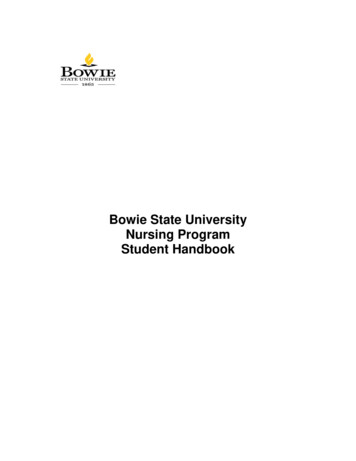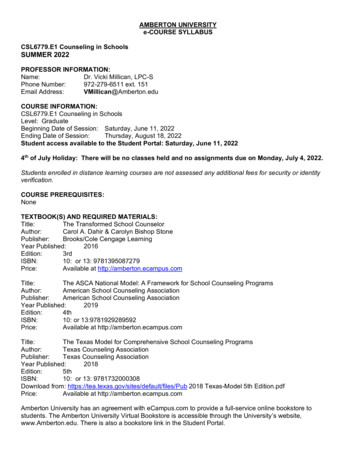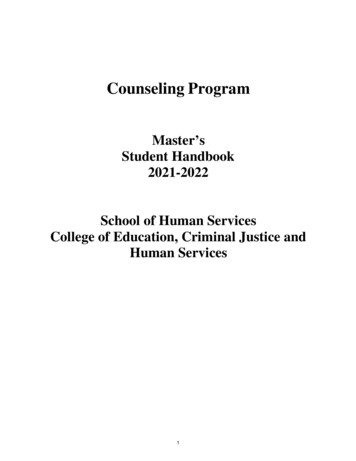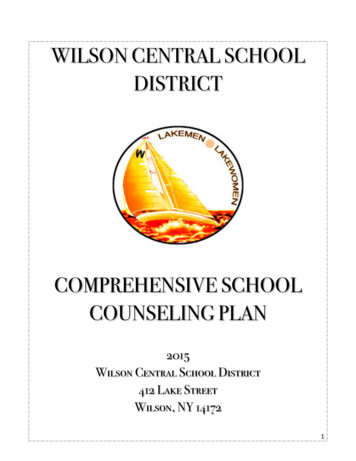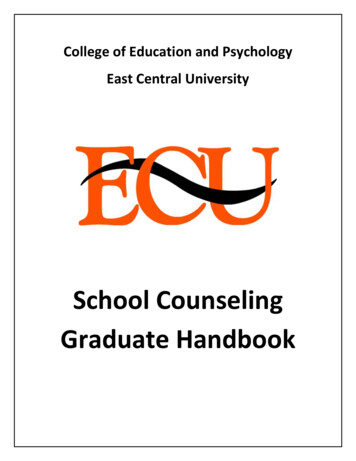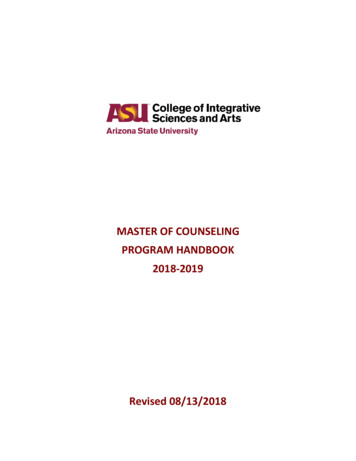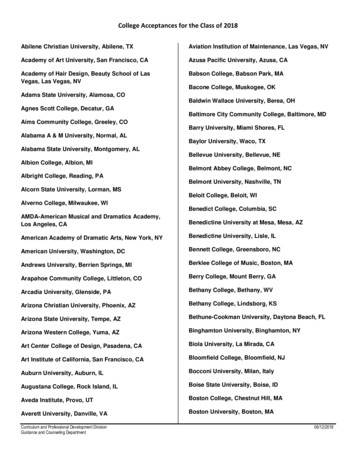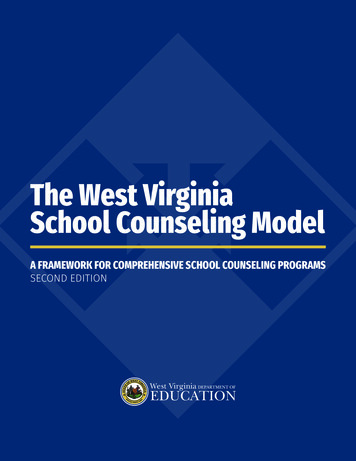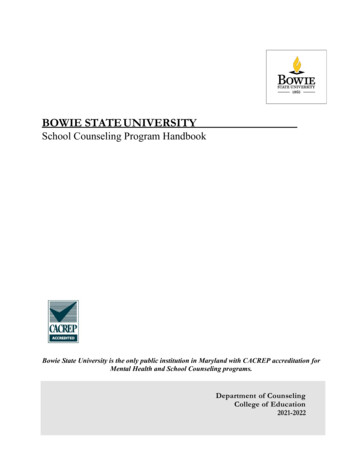
Transcription
BOWIE STATE UNIVERSITYSchool Counseling Program HandbookBowie State University is the only public institution in Maryland with CACREP accreditation forMental Health and School Counseling programs.Department of CounselingCollege of Education2021-2022
Table of ContentsWelcome and Introduction . 3University Mission and Vision Statements . 3University Core Values . 3University Accreditation . 4Program Accreditation. 4College of Education Mission Statement . 4Program Mission . 4Program Descriptions, Goals and Objectives . 4Program Transition Requirements . 6T1. Admission . 7T2. Core and Foundations . 7T3. Advance to Candidacy . 7T4. Program Exit . 7Professional Dispositions . 7Program of Study. 7Practicum and Internship Requirements . 91. Practicum . 92. Internship. 103. Grading . 10Program and University Policies and Procedures . 11Endorsement . 11Retention . 11Academic Appeal Policy . 12University Policies and Procedures . 12Professional Organizations, Resources and Engagement Opportunities . 14Student Academic and Disposition Process . 15Contact Information . 17Appendix. 18School Counseling Program HandbookPage 2
I.Welcome and IntroductionWelcome to the School Counseling Program in the Department of Counseling. This Handbook isdesigned to assist you with your academic and professional plan for completing your Master ofEducation degree. You will find information pertaining to the department, program policies andprocedures, steps in completing your degree requirements, sequencing of courses, general academicexpectations and requirements, and forms. All students in the program are assigned and must meetwith an Academic Advisor to discuss their program of study. Students must also read and will beheld accountable for the information pertaining to the degree requirements in the Bowie StateUniversity Graduate Catalog. You have chosen a commendable profession and the faculty here willassist you in developing academically, personally and professionally.We wish each of you a successful university experience.Cynthia L. TaylorSchool CounselingProgram CoordinatorII.University Mission and Vision StatementsMissionBowie State University empowers a diverse population of students from Maryland, the nation, and theworld to reach their full potential through its high-quality, liberal-arts-based bachelor’s, master’s, anddoctoral programs. The University provides a nurturing environment distinguished by a culture of successthat supports students in completing their course of study. As Maryland’s first historically black university,Bowie State inspires and prepares ethical and socially responsible leaders who can think critically, discoverknowledge, commit to lifelong learning, value diversity, and function effectively in a highly technical anddynamic global community.VisionBowie State University will be an important higher education access portal for qualified persons fromdiverse academic and socioeconomic backgrounds who seek a high quality and affordable publiccomprehensive university. The university will empower our students and improve our world throughrising enrollments, improving graduation rates, and service to the community. We will do so while placingspecial emphasis on the science, technology, teacher education, business, and nursing disciplines withinthe context of a liberal arts education.III.University Core ValuesExcellence: Bowie State University expects students, faculty, staff, and administrators to demonstrateoutstanding levels of performance by fostering a stimulating learning and work environment.Inclusivity: Bowie State University is intentional about creating a community that encouragesinvolvement, respect, and connection among students, faculty, staff, and administrators regardless ofdifferences of race, gender, ethnicity, national origin, culture, sexual orientation, religion, age, and disability.Integrity: Bowie State University students, faculty, staff and administrators demonstrate high ethicalstandards in their interactions with one another and the larger community.Accountability: Bowie State University expects each member of the University community to beresponsible and accountable for the outcomes of their efforts and actions.Innovation: Bowie State University aspires to infuse innovative practices into academic andadministrative functions by encouraging students, faculty, staff, and administrators to utilize bestpractices and pursue new opportunities.School Counseling Program HandbookPage 3
IV.University AccreditationBowie State University is accredited by the Middle States Association of Colleges and Schools(MSCHE). University departments are accredited by the National Council for the Accreditation ofTeacher Education (NCATE), the National Council of Social Work Education (CSWE), the NationalLeague for Nursing Accrediting Commission (NLNAC) Accreditation Commission for Education inNursing (ACEN), Maryland Board of Nursing (MBON), Association of Collegiate Business Schoolsand Programs (ACBSP), Network of Schools of Public Policy, Affairs, and Administration (NASPAA);and the Computer Accreditation Commission (CAC) of the Accreditation Board for Engineering andTechnology (ABET). The University is a member of the Council of Graduate Schools in the UnitedStates and the Northeastern Association of Graduate Schools. The College of Education programsare approved by the Maryland State Department of Education.V.CACREP AccreditationThe Council for Accreditation of Counseling and Related Educational Programs (CACREP) accreditscounselor education programs that meet identified national standards for counselor training.Graduating from a CACREP accredited program offers a level of distinction that can impactattainment of licensure, certification, and employment opportunities. The master’s Mental HealthCounseling and School Counseling programs are both CACREP accredited.VI.College of Education Mission StatementThe mission of the College of Education at Bowie State University is to prepare instructional leaders ofall races who are competent in their content specialty, grounded in the knowledge base of theirdiscipline, and sensitive to the ethnicity of the students they serve for positions in public and privateschools in Maryland and school systems in other states. The College's teacher education program modelrests upon a legacy of the best practices in the field of education and upon what research tells us aboutteaching and learning. Established in September 2000, the College of Education has adopted thefollowing theme for its academic programs: "Preparing Effective and Caring Educators for a GlobalSociety." The College strives through its programs to develop candidates who become academicscholars, skillful instructional leaders, and reflective practitioners in the schools and communities inwhich they work. It focuses on productivity and accountability of faculty, professional development,and specific development within its three academic departments: the Department of Counseling; theDepartment of Educational Studies and Leadership; and the Department of Teaching, Learning, andProfessional Development.VII.Program MissionIt is the Mission of the School Counseling program to prepare highly skilled, knowledgeable, andcompetent professional school counselors who are equipped to carry out the roles and responsibilitiesof professional school counselors who are endorsed by the American School Counseling Association,the Maryland State Department of Education, and the Council for Accreditation of Counseling andRelated Educational Programs. School Counselors will be skilled in understanding the needs of andworking with diverse populations with a myriad of learning styles and abilities. The faculty shallpossess the training and experience to prepare students to address the needs of the entire schoolcommunity as an advocate, leader, consultant, and coordinator. The curriculum will provide a range ofacademic experiences that focus on the changing needs of a diverse population of Pre-K – 12students.VIII.Program Descriptions, Goals, and ObjectivesThe Master of Education (M.Ed.) degree program in School Counseling is a 48-credit hour program(or an optional program with 60 credit hours focusing on various specializations). This 48-hourprogram is designed to prepare counselors to work with children and youth across all levels inschools from kindergarten to high school (P-12). The Master of Education (M. Ed.) program inSchool Counseling provides a basic understanding of individuals as cultural, economic, physical,School Counseling Program HandbookPage 4
psychological, and social beings (a) by incorporating multicultural and global perspectives of people inthe school, community and the world, (b) by assisting candidates in developing knowledge ofcounseling theory and practice through classroom and field experiences that are meaningful for theirprofessional growth and development of skills as reflective practitioners, (c) by demonstrating anunderstanding of a personal and interpersonal perspective through supporting and upholding theethical and legal standards of the counseling profession, standards and values of the educationalcommunity; further by showing respect for the diversity of all persons, serving the needs of allcandidates in helping them to achieve their maximal potential, and (d) by becoming effectivepractitioners through using technological applications and research to enhance candidates'awareness of educational, career, emotional, social, cultural, psychological/cognitive and physicaldevelopment. The program integrates the theoretical with the practical by combining academicpreparation in the area of behavioral sciences, as well as, related areas of counseling and researchwith practical experiences relevant to a diverse and multicultural school- age population.The program in School Counseling, in accordance with the Department of Counseling's mission,advocates equality of opportunity for all Candidates. It is designed to educate counselors inunderstanding and applying various counseling methods and techniques to aid a multicultural anddiverse candidate population with educational, vocational, and personal concerns. This broadapproach will permit the counselor to develop a repertoire of methods and select the mostappropriate for the particular problem and the specific Candidate. The counselor will accomplish thisrepertoire of methods in keeping with the Department of Counseling's mission and themes bybecoming an academic scholar, effective practitioner and using technological applications;demonstrating an understanding of multicultural and global perspectives of Candidates, specialpopulations, and personal and interpersonal perspectives. Through this program, the counselorobtains a variety of conceptual approaches to counseling and the understanding of social andpsychological factors in influencing human development and behavior and addressing the need forsocial equity and the closing of the achievement gap.The program strives to prepare highly effective and ethical counseling professionals who willpositively impact their students, clients, the counseling profession and the diverse populations theyserve in the community. Candidates are expected to demonstrate knowledge, skills and professionaldispositions as articulated in the CACREP standards.1.Candidates are expected to demonstrate in their course work, practicum and internshipexperiences the knowledge, skills and professional dispositions as articulated in the CACREPeight Common Core Standards.1.2.3.4.5.6.7.8.2.Professional orientation and ethical practiceSocial and cultural diversityHuman growth and developmentCareer developmentHelping relationshipsGroup workAssessmentResearch and program evaluationCandidates are expected to demonstrate in their course work, practicum and internshipexperiences the knowledge, skills and professional dispositions as articulated in theCACREP School Counseling Program Area Standards.School Counseling Program HandbookPage 5
1. Foundation, Knowledge, skills and practices of the history, roles, functions, professionalidentity, current models (such as ASCA), effects of diverse contexts and needs, andprocesses and operational management of the counseling practices.2. Counseling, Prevention, and Intervention. Knowledge, skills and practices of theories,processes, design, development and implementation of counseling programs, and strategiesto manage program effectiveness and impact.3. Diversity and Advocacy. Knowledge, skills and practices of addressing educational policies,programs, and practices and needs in multicultural settings, able to identify opportunitiesand maximize impact.4. Assessment. Knowledge, skills and practices on factors that affect personal, social, andacademic functioning, including various forms of needs assessments for academic, career,and personal/social development.5. Research and Evaluation. Knowledge and skills of current research and promisingpractices, models and strategies of evaluation, and methods of using data for improvement.6. Academic Development. Knowledge, skills and practices of concepts, principles, strategiesto promote academic success and close achievement gap; utilize curriculum design,instructional and management strategies for teaching counseling and guidance relatedmaterial.7. Collaboration and Consultation. Knowledge, skills and practices of theories, models, andprocesses of consultation in school system settings; strategies to build effective workingteams, and methods for collaboration with the communities.8. Leadership. Knowledge, skills and practices regarding roles of and strategies for effectiveleadership in design, implementation and evaluation of comprehensive school counselingprogram and related activities.9. Candidates are expected to demonstrate in their course work, practicum and internshipexperiences the knowledge, skills and professional dispositions as articulated in the COEInstitutional Standards.Centered on the theme of Preparing Effective, Caring, and Collaborative Educators,Counselors and Clinicians for a Global Society, the College strives to develop candidateswho become academic scholars, reflective practitioners, and collaborative leaders with astrong commitment to professional dispositions and innovative use of technology in theschools and communities in which they work.IX.Program Transition RequirementsT1. AdmissionIndividuals interested in pursuing the graduate program in School Counseling must qualify foradmission to the Graduate School. The following material must be submitted to the Office ofGraduate Admissions:a.Completion of a B.A. or B.S. degree with a minimum grade point average of 2.75 and at least12 credits in counseling, psychology or a related area.School Counseling Program HandbookPage 6
b. Completed Graduate Application Form with the non-refundable application fee.c. Submission of three letters of recommendation. Two letters must be from anacademic instructor and one letter from an employer/supervisor.d. Recommendation forms may be obtained from the Office of Graduate Admissions.The letters should address both your academic experiences and/or your experiencesworking with children and/or adolescents.e. Submission of a professional Resume/CV reflecting related work or volunteerexperiences.f. Submission of a personal statement. The personal statement must be a typewrittenstatement not to exceed three single spaced pages in which the following areaddressed:1. Discuss your knowledge of the school counseling profession2. Discuss your experience working with school age (P-12) students3. What personal qualities do you possess that would make you a good school counselor?g. Students who meet the above qualifications and are most suitable for admissionsto the program will be invited for an interview as the final stage of the admissionsprocess.Transition II. Core and FoundationUpon acceptance into the program, candidates are required tocomplete required 12-18 credit hours, achieving an overall grade pointaverage of 3.25.Transition III. Advancement to CandidacyAt the completion of 12-18 credit hours in the program, candidates are required tomake application for Advancement to Candidacy. The Counseling Faculty at this pointreviews each application. If candidates have a 3.25 grade point average and arerecommended by at least two members of the full-time faculty, they are advanced tocandidacy in the degree program.Transition IV. Program ExitCandidates are required to complete five (5) hours of professional development activities(PDA) in the community for each 3-credit hour course. In addition, candidates participate infield experiences in the schools throughout the program, complete a school practicum fieldexperience (100 clock hrs.) and an internship field experience (600 clock hrs.), pass astandardized Counselor Preparation Comprehensive Examination (CPCE) examination,develop a Comprehensive School Counseling program, and conduct a research study on acontemporary issue in schools, to be presented as a seminar paper/master thesis.1. Professional DispositionsCandidates are evaluated on professional work characteristics by field supervisors on thepracticum and internship evaluation forms. Also, faculty provides ongoing feedback tocandidates on dispositions during personal discussions and in other settings which showcaseclassroom projects, presentations, and professional development activities.2. Program of StudyA quality degree program is not an accumulation of credit hours, but it is a carefully developedsequence of educational activities and experiences designed to help you achieve the specifiedobjectives of the program. Thus, it is extremely important to properly sequence your program.School Counseling Program HandbookPage 7
You should complete the first level courses prior to advancing to the second level courses andso forth as indicated on the sequencing sheet. Some courses require prerequisites, and these arenecessary in order for Candidates to satisfactorily perform in the specified courses. Studentsneed to complete a program of study form and submit it to their advisor for signature. TheDean of Education and the Graduate School Dean must also sign the program of study. Thestudent receives a copy of the signed program of study. Students are required to maintain acopy of the program of study, as the approved program of study for completing the program.If the student changes major or tracks, the student needs to submit a new program of study.The student cannot graduate without an approved program of study for the program thestudent is to complete.Transition 1: AdmissionComplete BSU and Program Admission RequirementsOverall GPA Requirement of 2.75 or aboveAdmission Portfolio: Personal Statement: Interpersonal, Writing Skills, Academic Background & Experience (CV/Resume),Academic Transcript(s), and Candidate InterviewTransition 2: Core FoundationLevel OneCOUN502Principles and Philosophy of CounselingEDUC507Advanced Human Growth and DevelopmentCOUN633Multicultural CounselingCOUN734Counseling Theory and PracticeCOUN608Career Counseling and DevelopmentCOUN610Appraisal, Assessment, and EvaluationLevel TwoLevel ThreeTransition 3: Advancement780 Legal and Ethical Issues in TherapyCOUNCOUN731Group Counseling (Prerequisites: COUN 502 AND COUN 734)COUN706Introduction to Research for Counselors (Prerequisite: COUN 610)COUN799CPCE/Comprehensive Exam. Note: After completing the first nine (9) classes, you maytake the CPCE (Comp Exam). You must register and pass the CPCE/Comp Exam beforeregistering for COUN 861, COUN 836, and COUN 837Level FourCOUN840 Counseling Children and AdolescentsCOUN702 Introduction to School CounselingSPED511 Special Education PerspectivesSchool Counseling Program HandbookPage 8
603 Mental Health for Children and YouthCOUNLevel FiveCOUN861 Seminar in School Counseling***COUN836 Practicum in School Counseling (100 hrs.)***Transition 4: Program ExitCOUN837Internship in School Counseling (600 hrs.)***Additional Courses Needed if Pursuing Maryland Professional Counselor LicensureCOUN732Family CounselingCOUN762Drug & Alcohol CounselingMHCO744Psychodynamics of Psychopathology [DSM-5]MHCO833Advanced Techniques in Psychotherapy***Candidates must have completed Levels I, II, and III and have passed the CPCE/comprehensive examination before registering for these classes3. Practicum and Internship Requirementsa. PracticumCOUN 836 Practicum in School Counseling is designed and designated for thoseCandidates who are enrolled in the Master of Education degree (M.Ed.) program.Candidates must complete all courses in their program of study prior to entering COUN836 with the exception of COUN 861 Seminar in School Counseling. Candidates musthave also passed the CPCE/comprehensive exam prior to enrolling in COUN 836.The School Counseling program at Bowie State University was developed to meet theneeds of its degree-seeking Candidates. In so doing, the School Counseling programadheres to the Maryland State Department of Education's Certification requirementsand the Council for Accreditation of Counseling and Related Educational Programs(CACREP) guidelines and standards.All Candidates in the School Counseling program must attend a Field PlacementOrientation the semester prior to enrollments in COUN 836. Candidates failing toattend the Field Placement Orientation one semester prior to enrollment in COUN836 will not be permitted to complete the course or receive a field placement.During the Field Placement Orientation, Candidates must complete all requiredPlacement Applications and documents (Fieldwork information). Please note, allPracticum placement arrangements and procedures must be executed by the FieldPlacement Coordinator.Dates for the Field Placement Orientation will be posted on the School Counselingand Counseling Department Bulletin Board located in the James E. Proctorbuilding and announced through the Counseling Department listserv.School Counseling Program HandbookPage 9
b. InternshipCOUN 837 Internship in School Counseling is designed and designated for thoseCandidates who are enrolled in the Master of Education degree (M.Ed.) program.Candidates must complete all courses in their program of study prior to enteringCOUN 837 with the exception of COUN 861 Seminar in School Counseling.Candidates must have also passed the CPCE/comp exam prior to enrolling inCOUN 837 and completed Practicum in School Counseling COUN 836.All Candidates in the School Counseling program must attend a Field PlacementOrientation the semester prior to enrollments in COUN 837. Candidates failing toattend the Field Placement Orientation one semester prior to enrollment in COUN837 will not be permitted to complete the course or receive a field placement.During the Field Placement Orientation, Candidates must complete all requiredPlacement Applications and documents (Fieldwork information). Please note, allplacement arrangements and procedures must be executed by the Field PlacementCoordinator.Dates for the Field Placement Orientation will be posted on the School Counseling andCounseling Department Bulletin Board located in the James E. Proctor building andannounced through the Counseling Department listserv.c. GradingCandidates will receive either a Passing (P) or Failing (F) Grade for Practicum andInternship in School Counseling. Successful completion of 600 hours, a satisfactoryevaluation from the field supervisor and the university supervisor are required to receive apassing grade. If the Candidate is unable to complete the hours and satisfactorilydemonstrate both academic and professional competencies during COUN 837, theCandidate MUST register for COUN 805 Internship Advisement, to be able tosatisfactorily complete the internship experience.COUN 805 is one (1) credit hour.iSuccess/Task Stream StatementTo ensure success throughout the academic program, the COE has implemented theiSuccess, powered through Taskstream, as its assessment and accountability system thattracks candidate performance, program quality, and unit operations. Candidates areexpected to meet a set of performance criteria throughout the programs of study, whichinclude course-embedded and field-based signature assignments (SAs) as well as surveys.The assessments are strategically designed to measure candidate competencies asarticulated in national, state and professional standards. The SAs and surveys mandatoryfor course completion. Final grades will be held until satisfactory completion of theserequirements through iSuccess/Taskstream4. Program and University Policies & Proceduresd. EndorsementsThe School Counseling program is structured according to the guidelines and standards ofthe American School Counseling Association, the Council for Accreditation of Counselingand Related Educational Programs, and the Maryland State Department of Education. TheSchool Counseling Program is certified by the Maryland State Department of Educationfor meeting the state requirements. The program is guided by the standards of the Councilfor Accreditation of Counseling and Related Educational Programs (CACREP) and theSchool Counseling Program HandbookPage 10
roles and responsibilities of professional school counselor as set out by the AmericanSchool Counseling Association (ASCA). The School Counseling program is alsoconsidered a National Board of Certified Counselors approved graduate program. TheSchool Counseling program provides a dual purpose; with the addition of 12 credits,candidates also meet the requirements for licensure as a Maryland State Licensed ClinicalProfessional Counselor and are eligible to sit for the National Counselor Exam.e. RetentionAll candidates must advance to candidacy in order to move on in the program.According to university policy, candidates must secure a grade point average (GPA) of 3.25within the first 12- 18 semester hours of coursework in order to advance. In addition,school counselor’s applicants must pass faculty review which includes a review of theportfolio and candidate dispositions. If candidates do not advance, the candidate will meetwith t
School Counseling Program Handbook Bowie State University is the only public institution in Maryland with CACREP accreditation for Mental Health and School Counseling programs. Department of Counseling College of Education 2021-2022 . School Counseling Program Handbook Page 2
